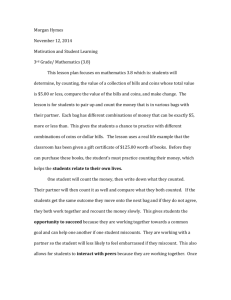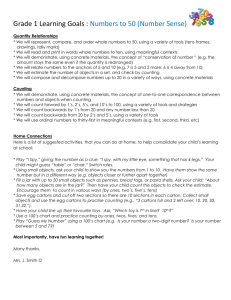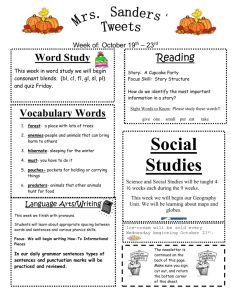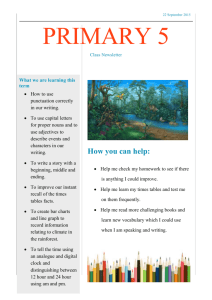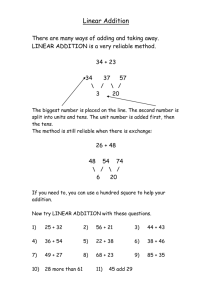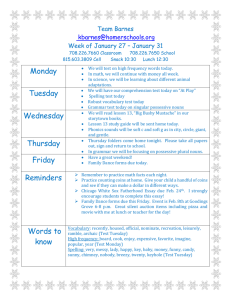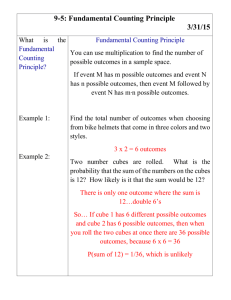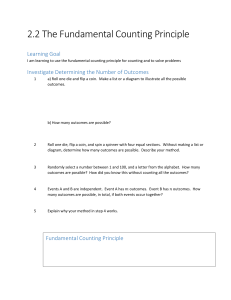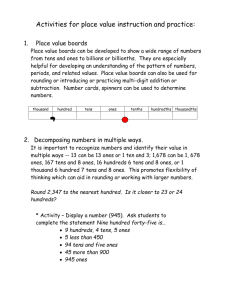Reading - Forsyth County Schools
advertisement
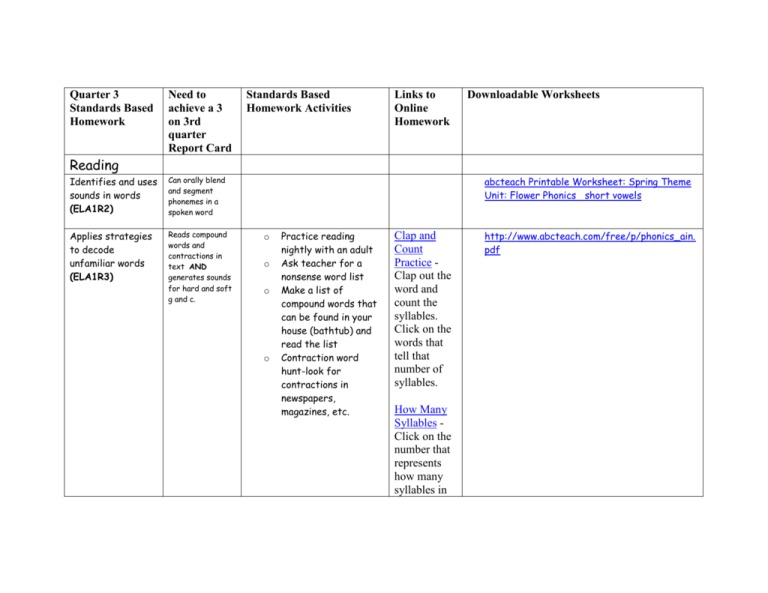
Quarter 3 Standards Based Homework Need to achieve a 3 on 3rd quarter Report Card Standards Based Homework Activities Links to Online Homework Downloadable Worksheets Reading Identifies and uses sounds in words (ELA1R2) Can orally blend and segment phonemes in a spoken word Applies strategies to decode unfamiliar words (ELA1R3) Reads compound words and contractions in text AND generates sounds for hard and soft g and c. abcteach Printable Worksheet: Spring Theme Unit: Flower Phonics short vowels o o o o Practice reading nightly with an adult Ask teacher for a nonsense word list Make a list of compound words that can be found in your house (bathtub) and read the list Contraction word hunt-look for contractions in newspapers, magazines, etc. Clap and Count Practice Clap out the word and count the syllables. Click on the words that tell that number of syllables. How Many Syllables Click on the number that represents how many syllables in http://www.abcteach.com/free/p/phonics_ain. pdf each animal's name Count the Syllables Word Jumble Click on Count the Syllables. Click on the correct button for the number of syllables in the word. Monkey Business: Rain Forest Run Around - Click on the words to put them in correct order. (from Game Goo Learning That Sticks!) Sequence the Story - drag the pictures in the correct order. Students can have the story read to them if necessary. Identifies high frequency words (ELA1R4) Reads automatically 100 or more Dolch Words Practice your Dolch sight words Practice with flash cards Practice with Power Point Use ideas from curriculum night folder Sequencing Many choices to select from. Choose one of the games and then number the pictures Body Parts Move the pictures by using the arrow on the right to match the word. http://www.abcteach.com/free/members/150 73.pdf Coconut Words Three Levels. Click on correct word to complete sentence. Sight Words - Read sight words, then type them in the box.. Dolch List Practice online activities to practice sight words. Missing Letters Find the matching sight word and type in the missing letters. High Frequency Words - 6 activities using sight words. Drag correct word in blank to complete the sentences. I Can Read Game Listen to the sentence then click on the spoken word. Sight Words - Match the word with the picture. Many, many selections Sight Words - Dolch Words, if you don't know the word, move your mouse over it and it will tell you what it is. Practice the words, then take the quiz. Acquires and uses vocabulary to communicate (ELA1R5) Identifies grade level words with multiple meanings, identifies synonyms, and uses new words introduced in reading. o o Make a list of words with multiple meanings and talk about how they are used appropriately (red, read, blue, blew) Multiple meanings memory game-make a card game from index cards by writing these types of words on a card for your child to make a match and use each word in a sentence correctly. Make a list of 5 Sight Word Practice Quizzes Many quizzes and levels. What's the Word - Build vocabulary by matching words with pictures. Contraction Practice Interactive contraction practice. Contractions - Type in the contraction http://www.abcteach.com/free/members/15409.pdf Synonyms Antonyms o Demonstrates comprehension of a grade-level text (ELA1R6) Identifies main idea and supporting details AND distinguishes fact from fiction in an independently read level G text (cold read only) o o o synonym words Use the weekly words listed in the newsletter in a sentence – oral or written beside the two words. Contractions - Matching game Irregular Plurals Match the related words, singular to plural. Grade One Read a story and Books discuss the main idea (“big picture”) and the Online Children can supporting details read to one (“small things”) that another from go with the story books that Read a fiction/nonfiction story-tell what are especially makes it a designed to fiction/non-fiction story-fiction has make match exactly with believe/made up elements & non-fiction Grade 1 Reading has real facts and Vocabulary information in it Make a web to retell a Lists. story o o Level worksheets Leveled reader Picture Sentence Worksheets Look at the picture. Circle the sentence that tells about the picture o Demonstrates fluency in reading (ELA1R4) Reads a level G text at 45 WCPM and above and self-corrects when necessary. (cold read only) o Schoolexpress-matching the sentence to the picture Writing Demonstrates competency in the writing process (ELA1W1) Consistently and independently writes and self edits an informational and /or narrative text of appropriate length with proficient use of ideas, organization, style and conventions. o o Practice writing stories-informational stories and narrative stories – brainstorm ideas and make a web before you write to get your thoughts together Have your child practice editing by going back and using a crayon/marker/colore d pencil to fix mistakes or add Characters Click on the different parts to create a character, then write a sentence about the character you created. Schoolexpress-complete the sentences o details to make the writing better Work on using a variety of words to start sentences Mechanics and Conventions Identifies parts of speech (ELA1W1) Consistently identifies and uses nouns, proper nouns, verbs AND personal pronouns. o o o o o Write a list of 5 nouns, proper nouns, verbs, pronouns (he, she) Grammar Huntlook/listen for nouns, proper nouns, verbs, pronouns in a movie, book, etc. and write them down Write 3 sentences and circle all the nouns/proper nouns/verbs/pronouns Find the nouns/pronouns/verbs /proper nouns in a book you read. Make a list of nounsreplace the noun with the correct pronoun. (The boy ran. He ran.) Maggie's Earth Adventures Nouns and Verbs - Put the trash into the correct bucket, separating the nouns and verbs. Schoolexpress-personal pronouns Proper Nouns Applies spelling/phonics skills to written work (ELA1W1) Spells most words using previously taught spelling patterns. o o o o Write a list of word family words and circle the “chunks” Rainbow write spelling words/sight words Use shaving cream to spell words Practice spelling words but add a suffix (ing, s, ed ) to practice spelling the word differently CVC Maker - Word PlayMake words and put them on Word list, then read them back. and Word Match Match word shown by using arrows by the letters. SpellBound Child sees the word spelled correctly, then letters are mixed up and child must put them in order again. Which Bird is Correct? pick the bird that is saying o o -ake word family -ale word families the written word and drag the parrot over to the word. Missing Word Listen to the sentence being said. Click on the missing word. Word Families Magnetic Blackboard create new words from word endings Word Maker - Select an ending, then combine letters to create words. Word Wheel - look at the clue at the bottom and then press each wheel to form the word's beginning and ending sound. Blends Word Wheel - look at the clue at the bottom and then press each wheel to form the word's beginning and ending sound. S or ES choose correct spelling ED or ING - choose correct word. Suffix practice more practice on s/es and ed/ing. Spell Check TCAP forma t, select word that is spelled incorrectly. Spell words Magnetic Board - drag letters to create word. Spelling put the letters in order to create the word that is said aloud. Spelling Click on the misspelled word and then fix it. For different words and spelling activities, check here Uses capitalization and punctuation (ELA1W1) Consistently and independently uses periods, question marks, AND commas in a series AND capitalization of initial words AND proper nouns appropriately in a sentence. o o o Practice writing complete sentences Practice writing different types of sentences using periods, question marks, & exclamation points Give your child a few Look, cover and Spell phonetic family of words to practice.Can change the level from easy to hard Find the correct sentence Choose sentence with correct capitalizatio n and o handwriting and punctuation sentences written on paper that do not have any punctuation. Have your child edit (add what is missing) with a colored pencil punctuation. Punctuation Find the correct punctuation mark to end the sentence. Special Names Find the correct capitalizatio n of proper nouns. Punctuation End the sentence with the correct punctuation. Punctuation Poems Learn about punctuation and create sentences using what you learned. Prints legibly in everyday work (ELA1W1) Can print with appropriate letter formation, correct case and spaces between words and sentences. o o o o o Practice your handwriting Practice writing the names of the people in your family Practice writing the names of favorite toys or games Make a categories list (fruits, animals, things that go….) Go back and look to see if letters are not formed correctly. Practice forming those letters neatly Fruit Words left handed writing pages Blank writing pages to use at home Research Uses reference materials to locate information (ELA1W1) Listening, With a graphic organizer, appropriately uses the Internet to gather information. o With the help of an adult use a kid friendly website to research about a favorite topic: sport, animal, rock star, etc. Use a graphic organizer to record information (web) Web Graphic Organize r for Internet Search The Moon - KWL Graphic Organizer Baseball Theme Unit: KWL Speaking, and Viewing Uses oral and visual strategies to communicate (ELA1LSV1) Retells stories read, heard or viewed by using complete sentences. Level testing practice Mathematics Number Sense and Operations Recognizes, describes, and extends patterns (M1N3) Counts all patterns (verbally or written) forwards and backwards by: *1's to 100 *5's to 100 *10's to 100 *2's to 50 o Practice counting up and back orally *1's to 100 *5's to 100 *10's to 100 *2’s to 50 (in the car is a great time for this) Connect the dots - Count by 2s and 5s Counting by Twos - Pick the number that is missing Counting by Twos Connect the Skip counting dot to dot Complete the patterns Patterns dots Counting by Twos Connect the dots Counting by Twos - Click on the fish that has the next number. Counting by Twos Counting Up by Twos Counting by Tens - Count up by 10s Counting by Tens - What is the Next Number if Counting Up by Tens? Practice sequences at FreeMathTes t - counting by 2's, counting by 10's What number would complete this sentence? find the missing addend. Busy Bees Find out how many bees are inside the hive. Count Us In - 12 activities that help with understandin g basic math. What number comes next? - Fill in the missing numeral; numbers to 100. Number Cracker Students guess what number comes next in the pattern. Orders numbers (M1N1) Independently and consistently uses manipulatives and/or a number line to demonstrate magnitude(scale) and order of numbers. o Put a set of random numbers (from 1-100) in order from the lowest to highest Pattern making What comes next? Find Squiggly Read and select the ordinal number under which you will find the worm. Practice Ordinal o o o o Make your own numberline number line with pictures Dominoes Write the next number Compares numbers (M1N1) Independently and consistently compares sets of numbers using terms greater than, less than and equal to up to one hundred. (Represent numbers larger than 10 in terms of tens and ones.) Understands and uses place value (M1N2) Reads and writes numerals to 100 with correct place value AND understands concepts of place value to build and o Play “What’s My Number?” – Given clues (my number is less than__ but more than __ and you say my name when you count by 5’s, etc…) child will guess number Play “Which is more or which is less?”- Flip two cards from a deck of cards, add them, repeat and tell which set is more or less than the other Given a number, tell a number that is more or less than that number (3 more or less, 2 more or less, etc..) Practice writing numbers from 1-100 and back in the correct order. (on a dry erase board, chalk Numbers name the ordinal Greater or Less Than Three levels of games. http://www.abcteach.com/free/1to10dominoes.pdfPlace Value Greater than/less than Number Comparison - choose correct symbol Illustrate Place Values - Create your numbers using the o Place Value to Hundreds Place Value to Tens record sets of less than fifty. o o board, magna doodle, or write them with pencils, pens, markers, or crayons – mix it up to keep interest levels high) Call out random numbers from 1-100 for your child to write. Or have your child write a number that is 1 more, 2 more, 1 less, 2 less, etc… Have your child tell you how many tens and ones a number is made of or draw you a picture using tens and ones to show a number. ones and tens place. Naming Place Values - ones and tens, hundreds Naming Place Value - Pick your tens and ones, then guess the number. Place Value - Type in the numeral that represents the amount of items grouped by 10s and ones. Place Value 100, 10, and 1 - Show your class how place values work. Place Value Games - Up to Thousands, three levels of games Determines the value of money (M1N1) Shows quantities of money using (Q,D,N,P) up to $0.75 and purchases items using bills up to $10.00. o o o Given an amount of money up to 75 cents or $10 (in bills)- show the amount in more than one way. Practice counting the coin/bills in Dad’s pocket/wallet or Mom’s purse. ‘Price’ some items at home to play store. Have your child buy items using coins up to 75 cents and bills up to $10. Shark Numbers Match numeral with tens and ones graphic Counting Money beginning site to stress money values.This site is no longer maintained and may have some dead links. Counting Money - Coins for teaching Fifty Cents o Allow your child to make small purchases for you at the store up to the above amounts. Harcourt School site Counting Change - a match game, counting coins to find amount of change and matching it with a numerical value. Counting Money online lesson for counting money Discovering Coin Values - drag coins into the cup to equal the amount in the blue area. How many coins? - Change money into coin values. Learn To Count Money - Set up the level you wish before starting game. Let's Compare Count the money on each side then use the <>= symbols to compare sides. Money Desk - Drag coins to total the amount of money asked for. Names of Coins Practice name of coins worth X amount. the reverse of the one just above this. Piggy Bank Drag coins into the piggy bank to total the amount of money. Value of Coins practice the value amount of coins Uses money to make equivalent trades (M1N1) Makes equivalent trades using coins (Q, D, N, P) up to $0.75 and bills up to $10.00 o Practice trading coins up to 75 cents and bills up to $10. Goal: Have less bills or coins than you started with. Knows addition/subtracti on facts (M1N3) Knows doubles facts up to 18 AND demonstrates knowledge of fact families as it applies to + and -. o o Solve addition/subtraction facts up to 18 Do addition/subtraction flashcards Addition Surprise Use a grid to move numbers to the correct spot. Arrithmattac k! - Race against the clock. Add as fast as you can in 60 seconds. Find the pictures - Do the sums to uncover the picture. Flash Cards Do the sums. Click on the yellow check mark at the bottom to keep score! You can also choose the Addition and Subtraction number of problems by clicking on the arrows up and down by the 25 default. Hidden Picture - The answer is given and you must select the problem to reveal a hidden picture. Good for a pair of students together. How many 10s can you make? online game Line Jumper - Using Everyday Math counting up skills to add with a number line. Matching Pictures to Number Sentences Find the correct number sentence to go along with the picture. Math Dojo Kick box your way to the top! Math Facts Timed math facts, or select practice mode without the timer. Paintbrush Math - each color is a different answer, solve the addition problems to paint the picture Picture Problems Match the picture problem to the number fact. Uses strategies to solve +/- problems (M1N3) Independently counts on AND back to solve addition/subtracti on problems AND uses subtraction to determine how many more/less when comparing two sets. o o Start at a number (ex. 25) and practice counting on from or back from that number (ex. 26, 27, ….) Give an addition or subtraction problem with a higher number and have your child count on or back to solve (59+3, 88-4, 62+2, 99-1) Addition/Subtracti on of 2-digit numbers (M1N3) Independently and consistently applies addition to 2-digit numbers without regrouping (eg. 15+13, 28-13) without using visual aids. Solve 2 digit +/problems without regrouping. (25+32) Determines equivalent names for numbers (M1N1, M1N2,M1N3) Build numbers up to 75 AND records five ways to compose/decompo se numbers up to 75 by using manipulatives, models, diagrams, tally marks and (+/-) number sentences. o Choose a number (up to 75) – represent the number in 5 different ways – tally marks, number words, counting, +/equations, tens and ones, etc…(any way to represent the number you can think of ) Recognizes models for fractional parts (M1N4) Identifies AND labels fractions (1/2 and 1/4) as equal parts of a whole using pictures and models. o o Use opportunities in the kitchen or anywhere else to discuss and show halves and quarters. Fold a paper into halves and then quarters. Discuss these equal parts of a whole. Add two one-digit numbers using a Quia matching activity 2 digit addition Adding money Fraction Review Fractions II Show the Fraction Color in parts to make the Fractional Parts manipulatives and Worksheet fraction. Name the Fraction Count the parts and name the fraction. Fraction Concentratio n - match fractions with shaded regions Crossing the River identify the fraction and help the man get across the river. Geometry Recognizes positional relationships (M1G3) Arranges AND describes objects per oral AND written instructions by proximity, position and direction : o Practice moving objects per oral instructions up, down, above, below, left, right, behind and in Math Lingo For each term or definition, click on the (up, down, above, below, left, right, behind, in front of) o o Classifies geometric figures (M1G1, M1G2) Identifies AND compares twodimensional AND 3-dimensional figures (circle, square, triangle and rectangle, hexagon, pentagon, cylinder, cone, rectangular prisms) and their common attributes AND creates pictures and designs with the shapes. Measurement Calendar Measurement (M1M2) o o front of Tell where objects are compared to one another using the above positional words Play a ‘Find It Game’. Write clues using the directional words that your child must follow to find something. Play ‘Guess My Shape’ – give clues about a shape and have your child identify it or switch roles (circle, square, triangle, rectangle, hexagon, pentagon). Find and draw objects in your house that are cylinders, cones, & rectangular prisms explain their attributes. matching piece on the game board. This site gives the user audio directions. Name the shape Counting sides and corners o Knows the number and names of the days of the week and months of the year. Time measurement (M1M2) Tells time to the hour AND half hour on an analog and digital clock. o o Practice saying/writing the days of the week (7) and months of the year (12) in order. Review often. Practice telling time to the hour & half hour. Telling Time- half hour interactive game for two players. Telling Time - Drag the five digital times to the correct analog clock, then press Stop the Clock to record your time. (30 minute increments) (15 minute increments) (5 minute increments) A Matter of Time Interactive quizzes on half hour, 15 minute 1. Telling Time Time to the half hour intervals and five minute intervals, in addition to story problems. What time is it? - for beginners just learning. Telling Time to the Hour Set the clock to the correct time. Bang on the Time- read the time in words and stop the clock when it is at the correct time. Stop the Clock Click on the Stop button then record the clock's time. Estimates, compares and measures (M1M1) Estimates and measures length AND weight of objects using a non-standard unit of measurement AND a created tool. o o Use a nonstandard unit (blocks, noodles, matchbox cars) to measure items around the house. Estimate how long you think the items will be before you measure. Given a group of objects, estimate how many there are. Count to see how many. Was your estimate too high or too low? Practice this a lot. Willy the Watchdog Interactive game for two players. Set the clock according to the roll of the die. Measure it - Short or tall Practice Non-standard measurement using a ruler, in inches and centimeters. Measuring by Centimeters - move the ruler and measure the line. Measure the Teddy Bears - Click on the correct measurement . Good for whole class review. Data Analysis and Probability Creates and interprets graphs (M1D1) Records data and interprets tally, picture AND bar graphs. Do an investigation: Think of a question to ask 10 people. (What is your favorite season?, What kind of pet do you have or would you like to have?, Which of these 3 ice cream flavors is your favorite?) Make a tally, picture graph or bar graph showing the results. Answer some questions someone asks you about your graph. Bar Graph Worksheet Reading a graph Process Skills Solves and creates word problems (M1P1) Solves AND creates addition AND subtraction word problems with sums up to fifty without regrouping. (must o o Create/write +/- word problems with sums up to 50. Have someone solve your problems. Have someone make up Four dozen word problems for you to use with your show work) some word problems for you to solve. You must show your work. class problems only, no answers, not interactive
